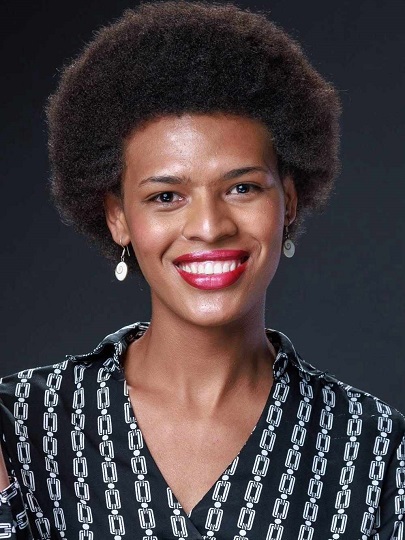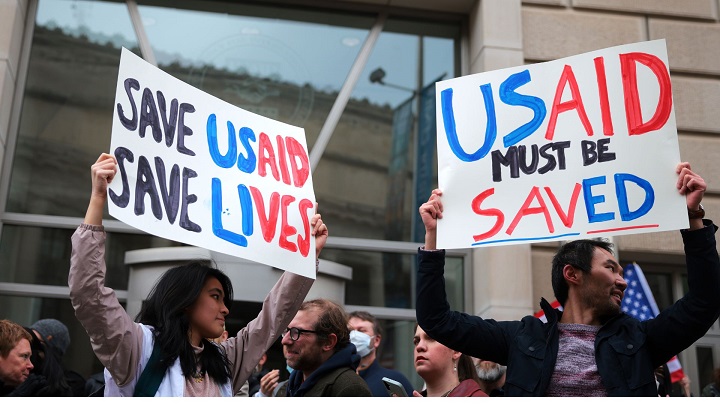SA Trans Community Feels Abandoned, Despondent Following USAID Freeze
Co-Written by Daniel Friedman and Nivrata Bachu
In January, US President Donald Trump issued an executive order suspending US foreign aid, creating uncertainty around the future of a range of organisations offering essential support to the LGBTQ+ community. Many organisations and clinics, as a result of the USAid freeze, are either temporarily or permanently closed, including the Wits Reproductive Health and HIV Institute (Wits HRI), which has announced its indefinite closure. One of the institute’s initiatives, the Wits HRI Trans Health Centre, has been an invaluable provider of gender affirming medication to South Africa’s trans community.
Aurora Krotoa Moses is the founder of the Aurora Kaleidoscope Movement, which seeks to provide “advocacy, education, and community-building” services to the LGBTQI+ community. I spoke to the 23-year-old transgender activist about the personal cost that the sudden lack of access to medication will have on her and others within the SA trans community; why this medication is essential to the wellbeing of transgender people; the general feeling of hopelessness and despondency that she has seen among trans individuals caused by their being targeted by the Trump administration; and why the South African government either can’t, or won’t, provide adequate care for its transgender citizens.
Essential Life-Saving Medication
“In my own life, it’s life-saving medication. It saved my life. I feel comfortable within my body, and the hormones help with that alignment. If access to this is restricted or taken away, especially for marginalised people struggling with poverty, how are we going to feel comfortable in our bodies or live our authentic selves?”
This is the question posed by transgender activist Aurora Krotoa Moses, who adds that she believes gender affirming medication should be seen in society and government as essential, rather than optional, to transgender people.
“They really have to start seeing this as essential healthcare. It’s people’s healthcare that’s now affected. None of the local, provincial, or national governments have spoken on the implications for the transgender and gender-diverse community. They need to prioritise this because it’s essential healthcare,” she adds. Once an individual makes the decision to medically transition, she explains, they need to take gender affirming medication for life. “Your body can’t go without it. There will be psychological trauma if you stop. In 2021, I went through that trauma when I couldn’t access my hormones. Seeing your body go backward is horrific,” she says.
Uncertainty About Future of Access to Medication
The anxiety is palpable in Moses’ voice as she explains the impact that a sudden lack of access to gender affirming medication is having on her. A feminist activist focussing on LGBTQIA+ and indigenous rights, she has long provided support and given voice to the concerns of transgender South Africans. But right now, it sounds like she could also use support. “There’s a lot of uncertainty,” she says, when asked if she believes the removal of access to her medication, which is essential to maintaining her hormonal balance, will be temporary or permanent.
Moses explains the fear that she and others are experiencing amid this uncertainty. “If I don’t get assistance, I will detransition, and it will have a massive mental effect on me. The hormones save me from gender dysphoria,” she adds, using a term that speaks to the mental anguish felt by those whose gender doesn’t match the one they were assigned at birth. “Without them, I won’t feel comfortable in my body. My ID is changed to female, but (if I detransition) my outward look won’t match my identity document again,” she continues, adding that she sees this as “an infringement on my dignity and human rights.”
The anxiety Moses feels over the withdrawal of access to medication is compounded by the fact that she is an activist, and as a result is deeply involved in the SA trans community, where she says a feeling of despondency is now pervasive. “When I went to the clinic for the last time, the room was filled with hopelessness,” she explains.
For Moses, this situation is a stark reminder of the different experience of trans people from impoverished communities compared to their wealthier counterparts. “Those with wealth can access medication privately. For those from less fortunate backgrounds, it’s not an option. A doctor’s appointment can cost up to 2,000 rand, plus blood tests and medication. Privately, it’s just not feasible for some of us,” she adds. “I include myself here,” she adds, explaining that she has personally been rationing her last batch of pills, taking one less a day so that they can last longer.

Danger of Black Market Alternative Medicines
Moses highlights that the withdrawal of funding is likely to force some transgender people to take dangerous risks. “Some are turning to the black market or contraceptives, which aren’t meant for transitioning. Without medical supervision, there can be serious consequences like hormonal withdrawals and health risks,” she explains.
While contraceptive pills are used by some as an alternative to hormone therapy, health experts strongly advise against this. According to UK reproduction clinic SH:24, “The oestrogen hormones in contraceptive pills are in a different form, and at different levels than those used in hormone therapy for trans women and non-binary people. Importantly, contraceptive pills also do not contain the anti-androgens which are used to block the effect of testosterone. Contraceptive pills therefore can’t be used in place of gender-affirming hormone therapy.”
Adding to the uncertainty caused by the Trump administration’s abrupt cutting of aid, are additional worries regarding the capacity – or willingness – of both the South African government and the Western Cape government to take steps to mitigate the harm the lack of medication is causing.
According to Moses, Cape Town’s Groote Schuur hospital has a backlog when it comes to dispensing medication, in a situation she describes as “overwhelmed ”. She also added that she worries about how those from the furthest reaches of the Western Cape’s rural areas will afford transport to the government hospital, and whether members of the trans community can safely travel there using the province’s public transport system, with minibus taxis being by far the most commonly used and viable method of travel.
In her capacity as CEO of the Aurora Kaleidoscope Movement, on February 17 Moses emailed the Western Cape’s MEC of Health and Wellness, Mireille Wenger, asking for answers and expressing her concerns.
“The Wits RHI Trans Health Centre is one of the few healthcare providers in South Africa that offers specialised care and support to transgender and gender-diverse individuals,” she wrote. “However, the funding stop has put the centre’s operations at risk, leaving many clients uncertain about their access to medication and treatment. Delayed or denied access to gender-affirming healthcare can have severe consequences, including detransitioning and psychological trauma”.
Her email requested that Wenger “provide immediate access to medication and treatment for affected clients”; “Develop a sustainable solution for funding and supporting transgender and gender-diverse healthcare in the Western Cape”; and “Provide training and capacity-building programs for healthcare providers in the province to address the specific needs of transgender and gender-diverse individuals.”
Government Slow to Respond
On February 25, the Western Cape’s Chief Director: Emergency and Clinical Services Support, Dr Juanita Arendse, responded to Moses. “We have continuous communication advising all clients that present at a closed clinic, wellness hub, or offsite collection point, to approach their nearest primary health care clinic,” she said. “Various engagements with service and finance managers are underway looking at finding sustainable solutions for all our key population groups within the Western Cape. While we cannot commit to continuing dedicated services, we commit to providing equitable healthcare to transgender and gender diverse people,” Arendse continued, adding that “guideline development, training and capacity building initiatives have commenced with support from partners” and that the goal of the Western Cape Department of Health and Wellness is to “provide equitable access to health care for all.”
Responding to Arendse, Moses expressed further concerns. She eventually received a reply, in which Arendse stated that “the WCDHW is unable to commit funds to a dedicated service based on pre-existing budgetary constraints.” While the email mentions a “guiding document” and an “advisory meeting” scheduled for May, as well as other future plans, as Moses noted, “there is no immediate intervention”. As a result, she says, “I and many other transgender and gender diverse people will detransition and go through psychological trauma.”
Raising Questions Around Human Rights & Access to Healthcare
This raises questions as to whether the Western Cape government is fulfilling its obligation regarding “equitable access to health care for all.” While general and vague responses see the provincial government taking some responsibility, there is silence when it comes to exactly how members of the Western Cape trans community – particularly those in rural areas, will go about accessing their medication amidst the Wits RHI Trans Health Centre’s current closure. It is unclear if the closure is permanent, with the organisation stating on Facebook that “we are unable to provide services until further notice”. I had not received a response to requests for comment from the organisation at the time of writing this article.
Moses has also reached out to the South African Human Rights Commission (SAHRC) as well as the Commission for Gender Equality, (CGE) but has not yet received a response, raising questions around whether government commissions seeking to address inequality and human rights issues, too, are willing or able to take steps to find solutions to the problems Moses, in her capacity as an activist for LGBTQI+ issues, raises.
The withdrawal of funding and resulting lack of access to medication comes as a huge shock to the transgender community in South Africa, but it’s also the latest in a long list of indignities they have faced, according to Moses. “One faces a lot of challenges on the ground, like access to healthcare and services, such as getting your name changed at the Home Affairs office. You face challenges of being discriminated against. There’s a bunch of challenges on the ground, even accessing employment because if your legal documents don’t align with how you present, you’ll get funny looks while looking for employment,” she explains.
The Effect Donald Trump Has on the World
Moses does not mince words when it comes to the effect Donald Trump is having on the world. She sees this not only in the more obvious and direct effects of the frieze in funding – sudden lack of access to medication — but also in the general attitude that Trump and similar right wing populists are spreading globally. “People feel emboldened to say transphobic things. Our daily lives have become even more of a struggle,” she says.
“I don’t understand why people are so concerned with what adults have in their pants,” she adds. “There’s an obsession with trans bodies and debating whether we’re real people. They can’t accept that we’re individuals with families, responsibilities, and lives. They try to frame it as a mental health issue, but it’s who we are,” she says, hinting at how it feels to have your identity explained away as a supposed mental illness.
Seeking Alternative Funding Options
Due to the instability of relying on the US for funding of this kind of aid, Moses is aware that, ultimately, alternative plans will need to be made. “We need to look at a sustainable way to access these medications. We can’t have a president issue orders that harshly affect people’s lives. There were nights I couldn’t sleep because I was so worried. Ideally, we’d get our medication through the public healthcare system, but we know how that’s going. We need long-term solutions,” she concludes.
Anyone wishing to help Aurora Krotoa Moses and the Aurora Kaleidoscope Movement can make a donation to:
Bank: Capitec
Account Holder: MS AURORA MOSES
Account Type: Main Account
Account number/IBAN: 2052469024
SWIFT/BIC number: CABLZAJJ
Branch Code: 470010






